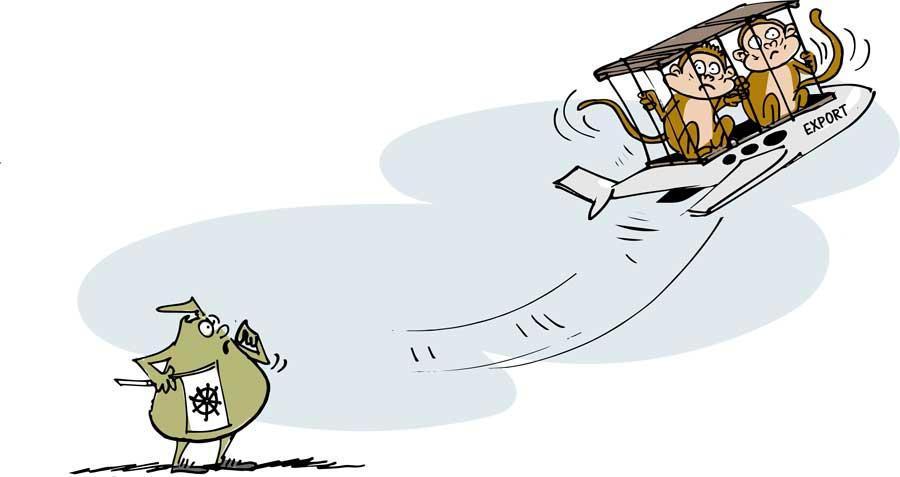21 Apr 2023 - {{hitsCtrl.values.hits}}

The Sri Lankan Government’s plan to export a species of monkey (Toque Macaques) has brought mixed reactions from several quarters in the island nation.
What stands at present is only a Govt. proposal, and the regime plans to submit a Cabinet Proposal to appoint a Committee that will recommend a proposal in this regard.
But when one studies the thinking behind the Government’s move it is clear that someone wishes to make a quick buck out of the venture. Why? Because, if at all this deal would come through, not with the blessings of the Chinese Government, but also with the initiative of a private firm.
In this regard two Ministers have been quoted; one being Govt. Spokesperson Bandula Gunawardane and Mahinda Amaraweera, who serves as Agriculture Minister.
For a starter, this species of monkey is hated by farmers because of the damage it does to crops. According to Government statistics, on average, crop damage by wild animals during the first half of 2022 was 144,989 metric tons within a range of 28 types of crops.
The monkey species in the news does the most damage to crops. This could be why the Government permitted farmers recently to kill six types of wild animals named in a list of crop destroyers. These six animals are the peacock, monkey, grizzled giant squirrel porcupine, wild boar and toque macaques.
Sri Lankan farmers have welcomed the move to rid the country at least of a small percentage of this species of monkey. But environmentalists have vehemently objected to the export of this monkey species. This is the problem with Sri Lanka; there are those, who would oppose any move whether it is to promote a business or to dissuade the wasting of a valuable resource.
One point however that must be considered closely is that the monkey species in question falls into the ‘Red List’ specified by the International Union for Conservation of Nature (IUCN). It is also endemic to Sri Lanka.
There is an opinion that sterilization is a way to curb its population growth, but then again environmentalists have raised questions about the feasibility, practicality and ethicality of such a thought.
From a human point of view, there are concerns about the safety of such animals being exported to any country. Speculation is rife that these Sri Lankan monkey species would end up in labs for experiments and not in zoos as discussed. It would be a little hard to digest if the news reaches us that the first consignment of this type of animal was used as fodder for a scientific experiment.
This monkey business associated with a firm also highlights another issue; the encroachment of humans into the animal territory. Jayantha Wickremasinghe, when he was the Chairman of the Coconut Cultivation Board had once said that humans had acquired their (Monkeys’) space so they’re attacking us. Doesn’t it tell a similar story as with the human-elephant conflict?
Another reason why monkeys and this type of species invade villages is that there is less food and water in the jungles compared to before.
The existence of the Sri Lankan monkey species underscores that Buddhist Sri Lanka must set a good example, where the concept of ‘live and let live’ is considered; because this is a concept promoted by every right-thinking and peace-loving person.
TheToque Macaques perhaps can benefit or regard themselves lucky as being born in Buddhist Sri Lanka because this nation doesn’t encourage moves that would wipe out an animal species that seemingly doesn’t offer any worthwhile good to society in return for its existence.
04 Jan 2025 4 hours ago
04 Jan 2025 4 hours ago
04 Jan 2025 6 hours ago
04 Jan 2025 6 hours ago
04 Jan 2025 6 hours ago